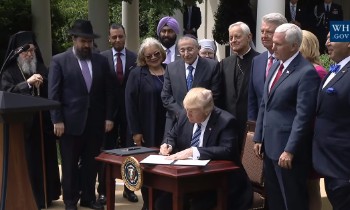
President Donald Trump signed an executive order to protect faith beliefs and practice in a ceremony May 4. Religious liberty advocates commended the action, but some said it fell short of what is needed. (Screen capture from WhiteHouse.gov)
WASHINGTON—Religious liberty advocates commended President Trump’s new executive order to protect faith beliefs and practice, but some said it fell short of what is needed.
Trump’s order—issued May 4 on National Day of Prayer in a ceremony at the White House Rose Garden—says:
- The administration’s policy will be to enforce vigorously the “robust protections for religious freedom” in federal law.
- The Department of Treasury, which includes the Internal Revenue Service, will not penalize a person, house of worship or other religious organization for speaking “about moral or political issues from a religious perspective,” thereby providing relief from a six-decade-old law known as the Johnson Amendment.
- The secretaries of three federal departments will consider revising rules to protect the freedom of conscience of religious objectors to the abortion/contraception mandate imposed by the Obama administration.
The executive order does not include protections for faith-based and other federal contractors who have established their employment practices on a biblical sexual ethic. Nor does it protect individuals and institutions from being penalized by the federal government for acting in support of their belief that marriage is only between a man and a woman.
Those types of protections were reportedly included in a draft executive order leaked to some news media in February.
Russell Moore, president of the Southern Baptist Ethics & Religious Liberty Commission, said, “After years of open hostility toward religious institutions and conscience from the previous administration, this executive order is a welcome change in direction toward people of faith from the White House. Not only that, but many federal agencies are working already to ensure that the executive and administrative violations of religious freedom from the Obama administration are being rolled back.
“The symbolism of mentioning the Little Sisters of the Poor and similar groups (in the order) is also important and welcome,” Moore said in written comments for Baptist Press. “No one should conclude, of course, that this executive order solves the wide array of challenges we face on the religious freedom front. Much, much more must be done — especially in terms of congressional legislation — to ensure that American citizens are able to serve their communities without violating their religious convictions.”
Frank Page, president of the Southern Baptist Convention Executive Committee, said he was deeply grateful to Trump for keeping his word.
“He promised me that there would be a strong push for religious freedom protection,” Page told BP in a written statement. “It is important for people to be able to express themselves according to their faith. It’s also extremely heartening to see that he wants to honor the conscience of believers who have serious moral concerns about participating in non-Christian activities.”
Michael Farris, president of Alliance Defending Freedom, said Trump’s executive order “provides hope … that he will move fully toward fulfilling his promise to protect religious freedom for countless Americans. Regrettably, this executive order leaves that promise as yet unfulfilled.
“(T)hough we appreciate the spirit of today’s gesture, vague instructions to federal agencies simply (leave) them wiggle room to ignore that gesture, regardless of the spirit in which it was intended,” Farris said in a written statement. “We strongly encourage the president to see his campaign promise through to completion and to ensure that all Americans—no matter where they live or what their occupation is—enjoy the freedom to peacefully live and work consistent with their convictions without fear of government punishment.”
Ryan Anderson, a senior research fellow who specializes in marriage and religious liberty for the Heritage Foundation, described the order as “woefully inadequate,” saying it “does not address the major threats to religious liberty in the United States today.”
“The Trump administration still has time to take meaningful action to reverse those trends, so that all Americans may seek out and serve God and their neighbors according to their own convictions, not the government’s,” Anderson said.
Becket, which represents religious organizations that objected to the abortion/contraception mandate despite the threat of huge fines, applauded the order.
“President Trump deserves credit for his order, and now the agencies and government lawyers need to follow through to finally give up this futile crusade,” said Mark Rienzi, Becket senior counsel.
Trump’s signing of the executive order coincided with a commemoration of National Day of Prayer. Former SBC President Jack Graham was among the religious leaders who prayed and stood behind Trump while he spoke and signed the order.
The Johnson Amendment, named after then-Senator and future President Lyndon Johnson of Texas, altered the federal tax code in 1954 to bar 501(c)(3) organizations “from directly or indirectly participating in, or intervening in, any political campaign on behalf of (or in opposition to) any candidate for elective public office.”
The amendment—and the way it has been wielded by liberal organizations especially—has caused confusion for many churches and pastors regarding what freedoms they have to address elections or even issues and the public policies affecting them.
Page said he will continue “to urge pastors to speak to issues that are clear scripturally. I will continue to do so as I preach God’s word, but I will not endorse any political candidate from the pulpit of any church.”
Michael and Jonathan Whitehead—Southern Baptist lawyers in the Kansas City, Mo., area who specialize in religious freedom issues—said in a written statement, “The Johnson Amendment has been used to intimidate pastors in pulpits if they preach about biblical principles as applied to particular political candidates. There are good reasons why pastors should be cautious about endorsing any candidate as ‘God’s choice’ for a political office. But wisdom should guide that choice, not a legal ‘gag rule’ which is used to silence conservative pastors in the pulpit.” (BP)
Tom Strode